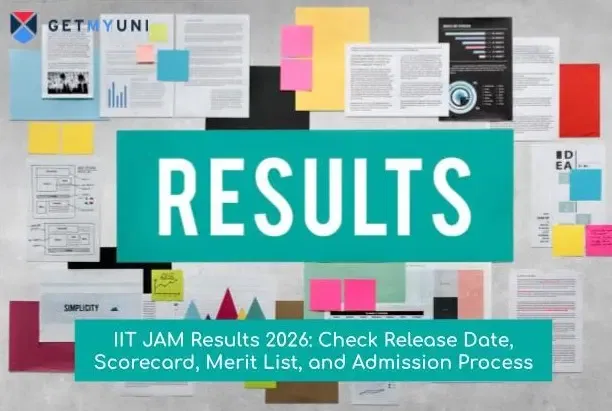IIT JAM scores matter significantly for securing admission into top-tier institutions offering research-oriented programs. These programs, in turn, build a strong foundation for pursuing Ph.D. opportunities and research positions
Table of Contents
The IIT JAM is a highly competitive exam conducted for admission into postgraduate programs like M.Sc., Integrated Ph.D., and other master's-level degrees at IITs, IISc, and other prestigious institutions in India. While the primary goal of the IIT JAM is to provide a pathway to advanced studies, its relevance in securing research positions or Ph.D. opportunities often sparks curiosity among all.
You are required to appear for the National Eligibility Test (NET) and score good marks to get admission into any Ph.D programs or research positions offered in various institutions all over India.
IIT JAM as a Gateway to Research-Oriented Programs
The IIT JAM primarily facilitates entry into research-oriented programs, such as:
- Integrated Ph.D. Programs: Many institutions, including IISc and IITs, offer integrated Ph.D. programs where a high IIT JAM score is crucial for admission.
- M.Sc. Programs with Research Opportunities: Admission to M.Sc. programs in top IITs and NITs often includes research components, preparing students for future Ph.D. opportunities.
SThose who gain admission through IIT JAM often benefit from exposure to cutting-edge research environments, experienced faculty, and state-of-the-art facilities.
Ph.D Courses with IIT JAM 2026
You can check the Ph.D courses offered by the top IITs in India along with the names of the respective IITs and their approximate tuition fees. Though NO IITs accept Ph.D candidates based on IIT JAM 2026 scores, you can use this table to understand the Ph.D areas offered by IITs.
| IIT | Ph.D. Program Areas | Tuition Fees (INR) |
| IIT Bombay | Aerospace Engineering, Chemical Engineering, Computer Science and Engineering, Electrical Engineering, Mechanical Engineering | INR 2,000/- to 10,000/- |
| IIT Delhi | Applied Mechanics, Chemical Engineering, Civil Engineering, Computer Science and Engineering, Electrical Engineering | INR 3,000/- to 7,000/- |
| IIT Kanpur | Biological Sciences and Bioengineering, Chemical Engineering, Civil Engineering, Computer Science and Engineering, Electrical Engineering | INR 2,500/- to 8,000/- |
| IIT Madras | Aerospace Engineering, Chemical Engineering, Civil Engineering, Computer Science and Engineering, Mechanical Engineering | INR 5,000/- to 10,000/- |
| IIT Kharagpur | Architecture and Regional Planning, Chemical Engineering, Civil Engineering, Computer Science and Engineering, Mechanical Engineering | INR 3,000/- to 8,000/- |
| IIT Roorkee | Chemical Engineering, Civil Engineering, Computer Science and Engineering, Electrical Engineering, Mechanical Engineering | INR 3,000/- to 10,000/- |
| IIT Guwahati | Biosciences and Bioengineering, Chemical Engineering, Civil Engineering, Computer Science and Engineering, Electronics and Electrical Engineering | INR 2,000/- to 8,000/- |
IIT JAM Career Scope After Ph.D
After completing a Ph.D. program, particularly if you entered the program through an IIT JAM-based M.Sc. or related pathways, there are several career paths you can pursue.
1. Academician
You can pursue a career as a professor or lecturer at universities and colleges, contributing to teaching and research in their field. Academia offers opportunities to guide you and lead research projects. As academicians, PhD graduates teach and mentor students at colleges or universities. They also conduct research and publish their findings to advance knowledge in their field.
2. Research Scientist
Work as a research scientist in government research institutions, private companies, or research labs. This role involves conducting advanced research, publishing papers, and contributing to scientific advancements. As research scientists, PhD graduates conduct experiments and studies to discover new information or develop new technologies. They work to solve scientific problems and contribute to advancements in their field.
3. Industry Expert
Apply your expertise in industry roles, such as Research and Development (R&D) positions in technology firms, pharmaceuticals, engineering companies, or other sectors related to your research. These roles often involve problem-solving and innovation. As industry experts, PhD graduates use their deep knowledge to guide and advise businesses in their field. They help companies solve complex problems and stay ahead by applying the latest research and trends.
4. Consulting
Provide expert advice and solutions to companies and organizations as a consultant. This can include roles in management consulting, technical consulting, or specialized areas depending on your field.
5. Entrepreneurship
Start your own business or technology startup based on your research findings or innovations. This path allows you to translate your research into practical applications and commercial products. For PhD graduates, entrepreneurship means turning their advanced knowledge into a new business or startup. They use their expertise to solve problems in innovative ways and create new opportunities in the market.
6. Government and Policy Making
Engage in policy-making, advisory roles, or administrative positions in government agencies or non-governmental organizations (NGOs) focused on science, technology, or education. For PhD graduates, working in government and policy-making means using their research to help create new laws and rules. They need to explain their findings clearly to help shape effective policies and decisions.
Also Read: Ph.D Syllabus and Subjects
Limitations of IIT JAM for Research or Ph.D.
While IIT JAM is a stepping stone, it is not the sole determinant of success in research or Ph.D. applications. Other factors that play a significant role include:
- Qualifying Examinations: Many universities and research institutes require additional qualifications, such as GATE, CSIR-NET, or institutional-level entrance exams.
- Research Publications: Those with published research papers often have an edge over those relying solely on academic qualifications.
- Statement of Purpose and Interviews: A compelling research proposal, strong motivation, and interview performance are critical in securing Ph.D. opportunities.
- Work Experience: Some institutes prefer candidates with relevant research or industry experience.























POST YOUR COMMENT